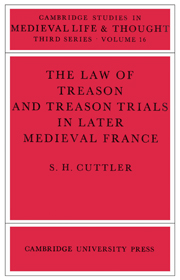Book contents
- Frontmatter
- Contents
- Dedication
- Preface
- Abbreviations
- Introduction
- 1 THE CONCEPT OF TREASON IN LATER MEDIEVAL FRANCE: LEGISTS, ‘COUTUMIERS’ AND TREATISE-WRITERS
- 2 THE CRIMES OF TREASON
- 3 JURISDICTION
- 4 PROCEDURE AND THE TRIAL OF PEERS
- 5 PUNISHMENT, FORFEITURE AND PARDON
- 6 TREASON AND THE CROWN 1328–1356
- 7 TREASON AND THE CROWN 1356–1380
- 8 TREASON AND THE CROWN 1380–1422
- 9 TREASON AND THE CROWN 1422–1461
- 10 TREASON AND THE CROWN 1461–1494
- Conclusion
- Bibliography
- Index
1 - THE CONCEPT OF TREASON IN LATER MEDIEVAL FRANCE: LEGISTS, ‘COUTUMIERS’ AND TREATISE-WRITERS
Published online by Cambridge University Press: 13 October 2009
- Frontmatter
- Contents
- Dedication
- Preface
- Abbreviations
- Introduction
- 1 THE CONCEPT OF TREASON IN LATER MEDIEVAL FRANCE: LEGISTS, ‘COUTUMIERS’ AND TREATISE-WRITERS
- 2 THE CRIMES OF TREASON
- 3 JURISDICTION
- 4 PROCEDURE AND THE TRIAL OF PEERS
- 5 PUNISHMENT, FORFEITURE AND PARDON
- 6 TREASON AND THE CROWN 1328–1356
- 7 TREASON AND THE CROWN 1356–1380
- 8 TREASON AND THE CROWN 1380–1422
- 9 TREASON AND THE CROWN 1422–1461
- 10 TREASON AND THE CROWN 1461–1494
- Conclusion
- Bibliography
- Index
Summary
The concept of treason in later medieval France was a hybrid one. In customary law, for example, the fundamental aspect was that of treachery. In his Coutumes de Beauvaisis, written c. 1283, Philippe de Beaumanoir proffered a definition of treason that illustrated the vicious nature of that crime. ‘Treason’, he wrote, ‘is when one does not give any indication of hatred but does indeed hate mortally so that, by this hatred, one kills or has someone killed, or assaults someone or has someone assaulted so that he whom one hates by treason is beaten unconscious ’There was no murder without treason, Beaumanoir continued, leading up to an expansion of his definition, but there could well be treason without murder, ‘for it is treason to assault someone or to cause grievous injury during a truce or in violation of a safe-conduct or by ambush; or to bear false witness in order to cause someone's death or disinheritance or banishment, or in order to cause his lord to hate him; or for many other similar causes’. Treason, then, as Beaumanoir defined it, was an unexceptional if still malicious crime that he naturally enough classed with the other felonies. It was for him what we should call ‘petty treason’. Nowhere, unfortunately, does he broach the topic of treason against the king or the kingdom, doubtless because his primary concern was to explain the customs of the Beauvaisis.
One will find that Beaumanoir differed little from the discussions on treason in such other contemporary works of customary law as the Etablissements de Saint Louis, the Usage d'Orlenois, or the Livres de jostice et de plet.
- Type
- Chapter
- Information
- Publisher: Cambridge University PressPrint publication year: 1982

